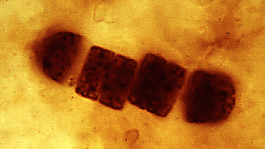I'm afraid you're wrong.
Extract from:
DOES SCIENCE NEVER ABSOLUTELY PROVE ANYTHING?
http://www.nars.org/Voice_of_Science_Articles/Does Sciences Ever Absolutely Prove Anything.pdf
It is with a great deal of reluctance that we are responding to a Letter to the Editor of
Science
.We were hoping that someone else would address the letter by Gleick et al(2010) that was signed by about 250 members of the(US) National Academy of Sciences.
That letter includes the statement “All citizens should understand some basic
scientific facts. There is always some uncertainty associated with scientific conclusions; science never absolutely proves anything.”
Unfortunately, we must disagree.
We are also confused by the statement included in the letter that concedes the existence of scientific “facts.” Obviously whereas the authors agree that there are facts, they do not agree that science can prove anything. The letter includes the statement:
“...when some conclusions have been thoroughly and deeply tested, questioned, and examined, they gain the status of ‘well-established theories’ and are often spoken of as ‘facts.’”
Let us use some examples of “absolutely” proven science:
1.
There is no reason to doubt the laws of physics governing acceleration and
momentum. These laws are the basis for a large number of industrial operations,
transportation and numerous other activities.
2.
Constituents of an atom include protons, neutrons (except for
1H) and electrons.
Nuclear power, nuclear medicine and numerous other industries are based on this
proven structure.
3.
There is no question that moon rotates around the earth and earth around the sun.
4.
The elemental composition of a large number of chemical compounds is known
and is the basis for the chemical, pharmaceutical, and numerous other industries.
5.
The gross anatomy of humans is well-established and beyond dispute. Normal
humans have two hands, two feet, two eyes, two ears, and one nose. They also
have brains, lungs, kidneys, livers, and stomachs.
6.
Under standard conditions water freezes at 0 oC and evaporates at 100 oC
7.
Human genetic material is composed of DNA which includes two complementary
strands and undergoes transcription and translation
.
8.
The reaction of silver nitrate and sodium chloride at sufficient concentrations
produces a precipitate consisting of silver chloride.
9.
Whereas certain diseases are caused by viruses, some others are caused by
bacteria.
It would be fruitless to describe other examples. Virtually every high-school student can
identify many other examples.
What happened? We are familiar with the scientific accomplishments of several
signatories of the letter and have difficulties understanding why such a large number of
exceptionally distinguished and accomplished individuals would sign
a letter containing such a fundamental error.
Our only explanation is that the urge to perform what they considered to be a noble cause was responsible for overlooking the error.
The conventional evolution of scientific knowledge often
starts with a hypothesis whose merit has to be evaluated by experiments and other tools.
Often
a theory is the next step after adding scientific evidence to a hypothesis. A
theory can also be the start of the process if sufficient evidence is provided in its formulation.
[Kindly note that a hypothesis and a theory are not identical. Koonin stated that UCA was a 'hypothesis'.]
The final goal in scientific endeavor is the formulation of a scientific law. Whereas theories include assumptions and unproven ideas
[such as the theory of evolution and the UCA], laws contain neither.
[...]
They concluded by saying:
The authors of the letter should recognize that based on the BAS/MESC:
“A scientific claim is settled if and when any investigator who has the necessary skills,
and, depending upon the issue, requisite equipment and facilities,
is able to reproduce and
confirm it.”
This cannot be said about evolution and the UCA hypothesis.
I trust that this clarifies the matter and my position.
 arwin’s theory of evolution a set of principles on which the practice of an activity is based:
arwin’s theory of evolution a set of principles on which the practice of an activity is based: